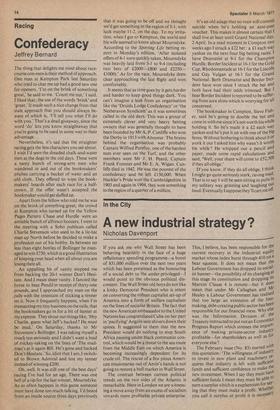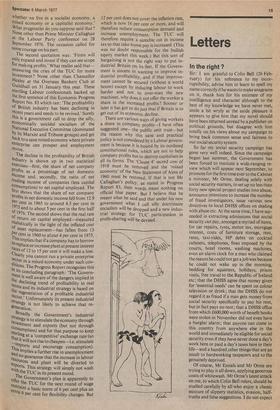In the City
A new industrial strategy?
Nicholas Davenport
If you ask me why Wall Street has been behaving bearishly in the face of a huge refiationary spending programme—a boost of $31,000 million over the next two years which has been presented as the honouring of a social debt to the under-privileged—I would point to the obvious political discontent. The Wall Street old boys do not like a kinky Democrat President who is intent on converting the robust capitalist set-up of America into a form of welfare capitalism on the lines of socialist Britain. The fact that the new American ambassador to the United Nations has congratulated Cuba on her part in 'pacifying' Angola sent shivers down their spines. It suggested to them that the new President would do nothing to stop South Africa passing under black communist control, which would be a threat to the sea route from the Middle East on which America is becoming increasingly dependent for its crude oil. The rescue of a few pious American missionaries out of Amin's hands is not going to restore a bull market in Wall Street.
The contrast between current political trends on the two sides of the Atlantic is remarkable. Here in London we are witnessing a move away from an excess of socialism towards more profitable private enterprise.
This, I believe, has been responsible for the current recovery in the industrial WO' market whose index burst through 410 on a bear squeeze. It does not mean that the Labour Government has dropped its socialist banner—the possibility of its changiog.at this stage its constitution and dropping its Marxist Clause 4 is remote—but it does mean that under Mr Callaghan and Mr Healey a Labour Government has realised that too large an extension of the loss making, debt-creating public sector has been responsible for our financial mess. Why else was the Information Division of the Treasury instructed to put out an Economies Progress Report which stresses the importenee of making private-sector industrY
profitable—for shareholders as well as for everyone else ?
The February issue (No. 83) started with this quotation: 'The willingness of industrY to invest in new plant and machinery. requires that industry is left with sufficient funds and sufficient confidence to make the new investment. When I say they must have sufficient funds I mean they must be able td earn a surplus which is a euphemism for saYing that they must make a profit. Whether, you call it surplus or profit it is necessarY
Whether we live in a socialist economy, a mixed economy or a capitalist economy. What pragmatist do you suppose said that ? None other than Prime Minister Callaghan at the Labour Party conference on 28 September 1976. The occasion called for some courage on his part.
The second quotation was: 'Firms will only expand and invest if they can see scope for making profits.' What realist said that_ answering the cries of the TUC for more investment? None other than Chancellor Healey at the Overseas Bankers Club at Guildhall on 31 January this year. These startling Labour confessionals backed up the first sentence of this Economic Progress Report No. 83 which ran: 'The profitability Of British industry has been declining in recent years and needs to be revived.' Surely this is a government call to drop the silly, economically suicidal socialism of the National Executive Committee (dominated by its Marxist and Tribune groups) and get back to a sane mixed economy where private enterprise can prosper and employment revive.
, The decline in the profitability of British Industry is shown up in two statistical exercises—first, the share of net company profits as a percentage of net domestic Income and, secondly, the ratio of net trading income of companies (less capital consumption) to net capital employed. The first shows that the share of net company Profits in net domestic income fell from 12:9 Per cent in 1965 to around 4.5 per cent in 1975 and to about 5 per cent in the first half 011976. The second shows that the real rate of return on capital employed—measured realistically in the light of the inflated cost 01 asset replacement—has fallen from 13 Per cent in 1960 to about 4 per cent in 1975. This implies that if a company has to borrow t° rePlace or increase plant at present interest rates of 12 to 15 per cent it will make a loss. Clearly you cannot run a private enterprise sector in a mixed economy under such conditions. The Progress Report recognises this In Its concluding paragraph : 'The GovernTent is well aware of the dangers implied in ttne declining trend of profitability in real erms and its industrial strategy is based on the regeneration of a profitable industrial Sector,' unfortunately its Present industrial
is not likely to achieve that re
Broadly the Government's industrial s.trategy is to stimulate the economy through Investment and exports (but not through cs.tenr !sit Inrng ption) and for that purpose to keep at a 'competitive' exchange rate (so tht it will not rise to cheapen—i.e. stimulate --VMPorts and encourage consumption). is Impliesa further rise in unemployment 2Id no guarantee that the increase in labour 'ources and plant will be diverted to evvx.esPorts. This strategy will simply not wash
ith the TUC in its present mood.
The Government's plan is apparently to toner the TUC for the next round of wage _estraint a basic norm of 6 per cent plus an extra 6 per cent for flexibility changes. But 12 per cent does not cover the inflation rate, which is now 16 per cent or more, and will therefore reduce consumption demand and increase unemployment. The TUC will therefore require a sizeable cut in income tax so that take-home pay is increased. (This was no doubt responsible for the bullish equity market this week.) But this sort of bargaining is not the right way to put industrial Britain on its feet. If the Government is sincere in wanting to improve industrial profitability, and if that improvement cannot be secured (without a world boom) except by inducing labour to work harder and not to over-man the new machines, why does it not offer the worker a share in the increased profits ? Sooner or later it has got to do just that if Britain is to get out of its economic decline.
There are various ways of giving workers a share in company profits—I have often suggested one—the public unit trust—but the reason why this sane and practical policy is not considered by a Labour government is because it is bound by its outdated constitutional rules, which are not to help company profits but to destroy capitalism in all its forms. The `Clause 4' sacred cow of 1918 must be removed and the 'mixed economy' of the New Statement of Aims of 1960 must be restored. If that is not Mr Callaghan's Policy, as stated in Progress Report 83, then words mean nothing on official blue paper. But I believe that he meant what he said and that under his new government what I call silly doctrinaire socialism will be dropped and a new industrial ' strategy for TUC participation in profit-sharing will be devised.



































 Previous page
Previous page